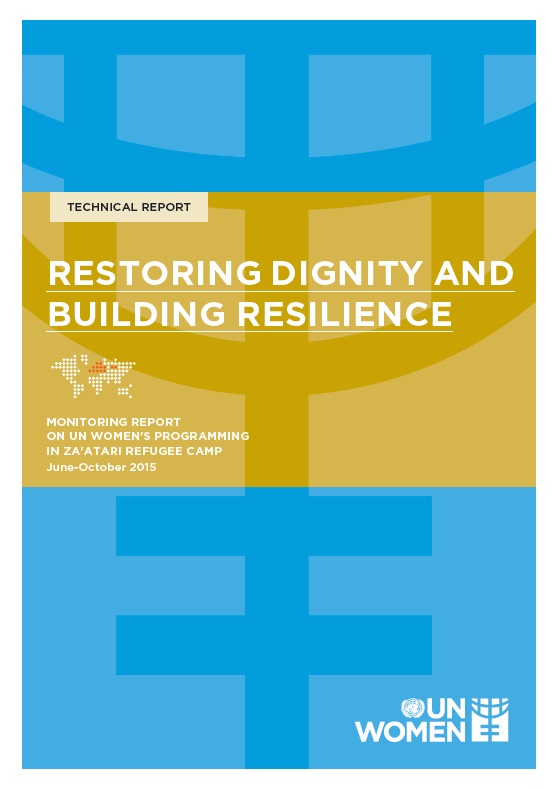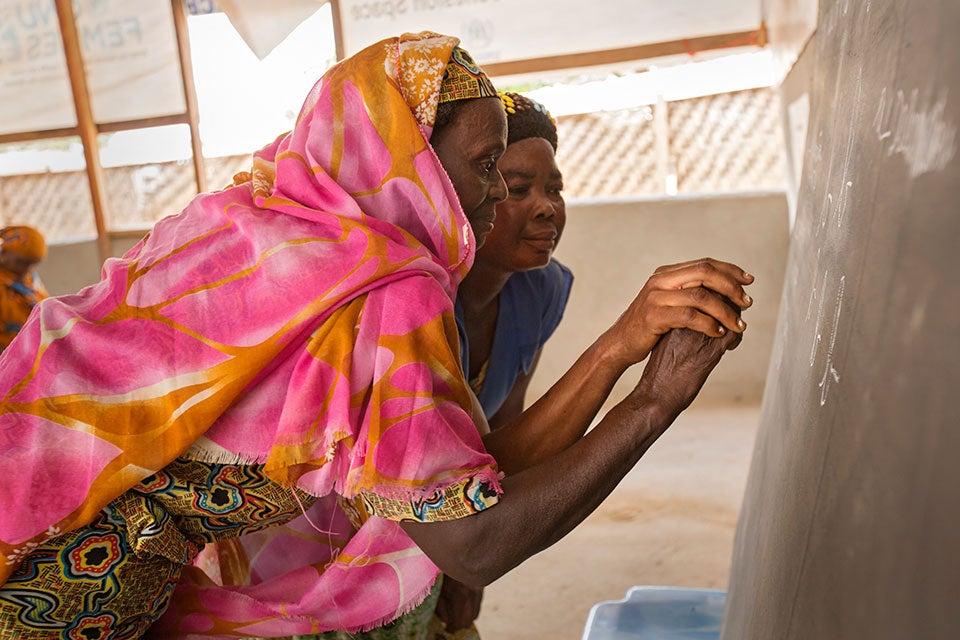Crisis response and recovery
During crises, such as conflict or disasters, women often endure extreme hardships, such as increased violence and insecurity, restricted mobility and additional care, domestic and livelihood responsibilities.
Although there is growing recognition of the importance of women’s participation in humanitarian action, women’s leadership roles as early responders and promoters of community resilience continues to be underutilized. Research shows that when women are involved in prevention and crisis response, it leads to better outcomes and lowers risk.
UN Women works proactively with humanitarian actors to ensure their emergency response plans adequately integrate gender equality and women’s empowerment; that women and girls are equally consulted to understand and address their needs and vulnerabilities; that women’s leadership is leveraged; that gender is integrated into humanitarian assessments, reporting and monitoring tools; and that gender experts are included in the humanitarian teams responding to the crisis.
Our solutions
UN Women’s roles in recent humanitarian crises have included:
- In Jordan, UN Women currently operates the largest female-focused cash-for-work programme in the Za’atari camp. Addressing critical livelihood needs of female-headed households in the Za’atari camp, where 74 per cent of all other existing cash-for-work initiatives target men, UN Women provides 164 cash for work opportunities daily. Three UN Women-run Oasis Centres benefits 16,000 people in the camp, while 11 safe spaces benefit refugees and host communities throughout the north of Jordan by increasing women’s access to educational, recreational and psychosocial support.
- In Cameroon, UN Women has established eight Women Cohesion Spaces in refugee camps and host communities that serve as safe havens and provide integrated services for refugees, internally displaced persons, former Boko Haram female hostages and vulnerable women from host communities. In addition to psychosocial support and peer support, the Women Cohesion Spaces host economic services and income generating activities for refugees, displaced and vulnerable women. These include provision of economic kits to kick-start small-scale income-generating activities, cash transfers to women heads of households in the most vulnerable communities, and skills training.
- During the Ebola crisis of 2014-2016 in West Africa, UN Women facilitated mobilization and information efforts targeting women who were disproportionately affected by the crisis. Moreover, UN Women coordinated UN efforts to integrate gender within the response, supported the collection of sex-disaggregated data and produced educational materials to train health workers. In Sierra Leone and Liberia, UN Women worked with local radio stations and with traditional leaders to raise awareness, and to curb the spread of Ebola and mitigate its impacts. In Liberia, many women were pushed out of business due to the closure of markets as part of strategies to reduce transmission of the Ebola virus. The challenge of recovering from the impacts of the Ebola outbreak in terms of economic opportunities and gender inequality are being tackled through interventions by UN Women working with the Ministry of Gender, Children and Social Protection.
- In Nepal, in the immediate aftermath of the 2015 earthquake, UN Women established five multi-purpose women’s centres run by women’s groups in collaboration with local government, and three information centres. UN Women reached approximately 42,703 affected women, including the most vulnerable and marginalized groups, such as widows, disabled women, female heads of household and Dalit (lower caste) women. Through these multi-purpose centres, women were offered a range of services, including psychosocial counselling and trauma assistance; legal referrals for survivors of violence; and information and access to livelihood opportunities. The centres also helped with awareness-raising and information dissemination about relief and recovery related activities, including through messages on local radio and by deploying community mobilizers.
- After the Fiji floods in 2012, a UN Women gender review revealed that the response had not adequately addressed gender issues. As a result, partners recognized the gaps and the Government and United Nations Gender Group requested trainings on gender in humanitarian action. With the support of UN Women, the Ministry of Women developed Standard Operating Procedures for Gender-Based Violence, with specific considerations for humanitarian settings. The Fiji National Disaster Management Office established a national Protection Cluster and, with technical assistance from UN Women, developed Guidelines for Evacuation Centers to ensure protection of women and girls
Latest news
Featured Publication
-
Restoring dignity and building resilience: Monitoring report of UN Women's programming in Za'atari Refugee Camp
This report reflects the findings of programme monitoring undertaken in 2015. The data highlights the importance of engaging people productively to build gender equality and combat violence against women, while also enhancing household dietary diversity and food security through increased household spending. More
World Humanitarian Day
While everyone suffers in crises, women and girls experience unique risks. All forms of gender-based violence against women and girls spike during disasters and conflict; rates of girls dropping out of school or getting married too early may also rise. Crisis often hit women’s livelihoods hardest, in part because they tend to work in informal sectors more.More
Online training
Gender in Humanitarian Action: Different Needs – Equal Opportunities
This free online course provides guidance on the fundamentals of applying gender equality in humanitarian programming and response – including in camp management and coordination, education, food security, gender-based violence, health, livelihoods, non-food items, protection, shelter, water, sanitation and hygiene. Register ►


